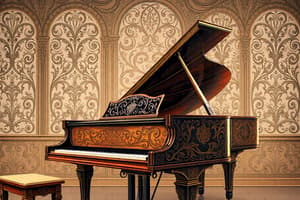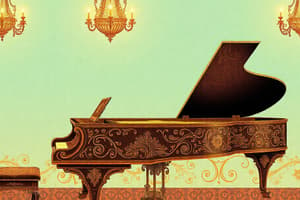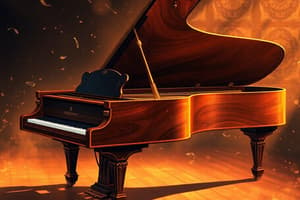Podcast
Questions and Answers
In Passage A, what does the phrase au sein de la famille suggest about the role of pianos in some households?
In Passage A, what does the phrase au sein de la famille suggest about the role of pianos in some households?
- Pianos were often neglected and treated poorly despite their value.
- Pianos were viewed as tools for professional musicians only.
- Pianos were considered essential and cherished members of the family. (correct)
- Pianos were primarily status symbols, displayed but rarely used.
Which of the following best describes the contrasting attitudes presented in Passage A regarding how people treated pianos?
Which of the following best describes the contrasting attitudes presented in Passage A regarding how people treated pianos?
- Some preferred modern pianos, while others favored antique instruments.
- Some played the piano skillfully, while others struggled to produce music.
- Some invested heavily in piano maintenance, while others neglected upkeep.
- Some treated pianos with reverence, while others saw them as ordinary objects. (correct)
In Passage B, what is the most likely reason the author mentions moments when the violin 'stubbornly refuses to do my bidding'?
In Passage B, what is the most likely reason the author mentions moments when the violin 'stubbornly refuses to do my bidding'?
- To emphasize the author's frustration with the physical limitations of the instrument.
- To illustrate the unpredictable nature of musical performance and the challenges of mastering an instrument. (correct)
- To suggest that the violin has a will of its own.
- To highlight the author's lack of skill despite years of practice.
How does the author of Passage B likely view the relationship between a musician and their instrument?
How does the author of Passage B likely view the relationship between a musician and their instrument?
Both Passage A and Passage B allude to:
Both Passage A and Passage B allude to:
If a piano owner from Passage A treated their piano as an 'altar,' how might the author of Passage B react to their playing?
If a piano owner from Passage A treated their piano as an 'altar,' how might the author of Passage B react to their playing?
Which statement best summarizes a common theme in both passages?
Which statement best summarizes a common theme in both passages?
Suppose the author of Passage B attempted to restore a neglected piano described in Passage A. Which of the following actions would best reflect the author's likely approach?
Suppose the author of Passage B attempted to restore a neglected piano described in Passage A. Which of the following actions would best reflect the author's likely approach?
Flashcards
Au Sein de la Famille
Au Sein de la Famille
Being 'au sein de la famille' means being at the heart of the family, often influencing decisions and feeling deeply connected.
Worshipping Art
Worshipping Art
To regard something as sacred and worthy of deep respect and veneration.
Expressing Emotion
Expressing Emotion
To strive to express emotion through music
Stubborn Instrument
Stubborn Instrument
Signup and view all the flashcards
Passage
Passage
Signup and view all the flashcards
Love for the Violin
Love for the Violin
Signup and view all the flashcards
Range of Emotion
Range of Emotion
Signup and view all the flashcards
Strive
Strive
Signup and view all the flashcards
Study Notes
- Passage A is adapted from "The Piano Shop on the Left Bank" by Thad Carhart.
- Passage B is adapted from "Me and My Violin" by Arnold Steinhardt.
Passage A by Thad Carhart
- Even when Luc was busy, he welcomed the narrator and allowed him to wander.
- When things were quieter, Luc would tell the narrator about the pianos that had just arrived.
- Luc believed each piano had completely individual characteristics, even if from the same manufacturer and age.
- Sometimes Luc knew details of a piano: owners, their relationship with the instrument, and how they treated it.
- Other times, Luc knew nothing beyond what he could see, feel or hear regarding the pianos.
- Most pianos came to him from auctions or charity sales, so their history was anonymous.
- Luc could deduce a great deal: whether a piano had been played much or little, humidity levels maintained, and whether children were in the household.
- The "worst thing" to do to a piano was transport it by ship.
- At these moments, Luc became a detective, archaeologist, and social critic.
- Luc's attitude was about how people treated pianos reflecting his philosophy of life.
- Luc regarded depredations worked by children on keyboards and strings as tolerable because the piano was at least used.
- "Au sein de la famille" translates to "at the heart of the family".
- If drinks were spilled and stains were on the piano, that was the price paid for initiating the young to a joy that should stem from familiarity rather than reverence.
- Those who preserved their piano as an altar for the art of music to be worshipped irritated Luc.
- Luc was deeply respectful of serious musicians who used and depended upon their instrument for their livelihood.
Passage B by Arnold Steinhardt
- Marc Lifschey, a great oboist, sold his oboe after retiring as a performer and teacher.
- Giving up an instrument no longer used seems reasonable, but the narrator was taken aback.
- Even in retirement, the narrator wondered if Marc would have some sort of lasting relationship with his oboe rather than performing on it.
- The narrator wondered if Marc would want to keep his oboe as a reminder of the magnificent music the two had made together.
- Joseph Roisman, first violinist of the Budapest String Quartet, seemed content to give up his beloved Lorenzo Storioni when he agreed to sell after the Quartet retired.
- When the narratormet with Roisman, Roisman had second thoughts and said he would sell the violin someday, but for now, he was enjoying playing chamber music with friends every Friday night, and he did so until his death a year or two later.
- Lifschey and Roisman dealt with retirement differently.
- Their stories made the narrator wonder about his relationship with his violin if and when he retires, but also about the very nature of a musician's relationship with his instrument.
- The narrator begun playing violin at six years old and is now seventy-six with it being an integral part of him.
- There are times when narrator feels violin has been his very close friend, as they respond with an astonishing range of substance and emotion.
- Other times, however, the violin refuses to do the narrator's bidding, or only reluctantly plays in tune.
- When that happens, the narrator has to cajole, bargain, or adjust to its every whim.
Studying That Suits You
Use AI to generate personalized quizzes and flashcards to suit your learning preferences.




